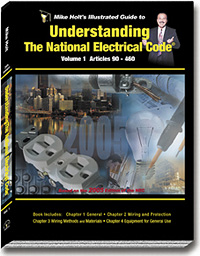Dear All,
I have recently completed my bachelors in Electrical Engineering,Since i am recently hired by an electrical design and consulting firm,one of the main things they have asked me to have is good familiarisation of National Electric code.
I have gone through the entire book but it looks very difficult to keep things in mind ,Since many of you are already experienced in this industry,i would really appreciate if you could give me any suggestions pertaining to having good grip on NEC .
P.S i appologize if i posted this thread in the wrong forum.
Kindest Regard to all.
I have recently completed my bachelors in Electrical Engineering,Since i am recently hired by an electrical design and consulting firm,one of the main things they have asked me to have is good familiarisation of National Electric code.
I have gone through the entire book but it looks very difficult to keep things in mind ,Since many of you are already experienced in this industry,i would really appreciate if you could give me any suggestions pertaining to having good grip on NEC .
P.S i appologize if i posted this thread in the wrong forum.
Kindest Regard to all.



